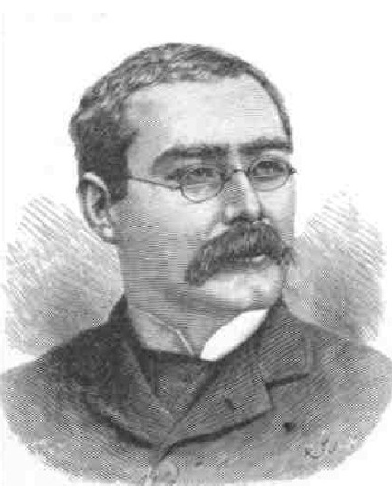|
|
Online Poems for Craig White's Literature Courses |
|
|
Colonial / Imperial Poems by Rudyard Kipling 1865-1936 |
|
Rudyard Kipling's remarkably active, productive, and international life began with his brith in British-colonial India (present-day Pakistan). Throughout his life he traveled widely and lived in England and the USA (Vermont).
Kipling's literary talent was enormous. His poems and fiction were popular up and down the English class system. His popularity continues today in children's literature and adventure films.
Many of his novels took on important social or psychological issues and were regarded seriously by leading literary critics.
His support for the British Empire and for British involvement in World War 1 (in which his son died) distorted his later public image to that of a belligerent chauvinist, but as with many colonial writers, his texts themselves at least acknowledge complexities of modern life including imperialism and the meeting of cultures.
Popular works by Kipling:
The Jungle Book (1894)
"If"--popular oratorical poem
"Gunga Din"
The Man Who Would Be KingOnline short stories by Rudyard Kipling
"They," very fine ghost story by Kipling
from The Ballad of East and West
Oh, East is East, and West is
West, and never the twain shall meet,
Till Earth and Sky stand presently at God's great Judgment Seat;
But there is neither East nor West, Border, nor Breed, nor Birth,
When two strong men stand face to face, though they come from the ends of the
earth!
![]()
The White Man's Burden
THE UNITED STATES AND THE PHILIPPINE ISLANDS
Take up the White man's burden— Send forth the best ye breed— Go bind your sons to exile To serve your captives' need; To wait in heavy harness 5 On fluttered folk and wild— Your new-caught, sullen peoples, Half devil and half child. [cf. Caliban in Shakespeare's The Tempest] Take up the White Man's burden— In patience to abide, To veil the threat of terror 10 And check the show of pride; By open speech and simple, An hundred times mad plain. To seek another's profit, And work another's gain. 15 Take up the White Man's burden— The savage wars of peace— Fill full the mouth of Famine And bid the sickness cease; And when your goal is nearest 20 The end for others sought, Watch Sloth and heathen Folly Bring all your hope to nought. Take up the White Man's burden— No tawdry rule of kings, 25 But toil of serf and sweeper— The tale of common things. The ports ye shall not enter, The roads ye shall not tread, Go make them with your living, 30 And mark them with your dead! Take up the White man's burden— And reap his old reward: The blame of those ye better, The hate of those ye guard— 35 The cry of hosts ye humour (Ah, slowly!) toward the light:— "Why brought ye us from bondage, "Our loved Egyptian night?"* [*imperial mission paralleled to God's providence: allusion to Exodus 14.12: "it had been better for us to serve the Egyptians, than that we should die in the wilderness. ] Take up the White Man's burden— 40 Ye dare not stoop to less— Nor call too loud on freedom To cloak your weariness; By all ye cry or whisper, By all ye leave or do, 45 The silent, sullen peoples Shall weigh your Gods and you. Take up the White Man's burden— Have done with childish days— The lightly proffered laurel, 50 The easy, ungrudged praise. Comes now, to search your manhood Through all the thankless years, Cold-edged with dear-bought wisdom, The judgment of your peers! 55
Historical notes: Spanish colonization of the Philippines (named for Spanish King Philip II,1527-1598) began in 1521 during the first circumnavigation of the globe by Spanish explorer Ferdinand Magellan in 1519-22.
The Spanish-American War (1897-98) led to the 1898 Treaty of Paris, which transferred colonial possession of the Philippines (as well as Puerto Rico, Guam, and control of Cuba) from Spain to the USA. The Philippine-American War (a.k.a. the Philippine War of Independence) followed from 1899-1902. Commonwealth status was granted in 1935. Japan occupied the Philippines in World War 2. (Professor White's father, a U.S. Navy Lieutenant, was stationed in the Philippines in 1945.) In 1946 the Treaty of Manila granted the Philippines status as an independent nation.
The Philippines is the world's 12th most populous nation with 94 million people, and 11 million people working abroad.
Phillipinos / Filipinos are among the most multicultural or postcolonial ethnicities in the world.
-
Asian genetic past, Tagalog language; Japanese occupation during World War 2
-
Spanish influences: Catholicism, currency is peso, some Spanish language?
-
American influences: considerable military patriotism for USA
-
+ Muslim insurrection in rural Phillipines


